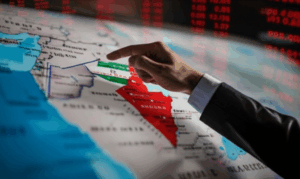Stock Markets Under Pressure as Iran Tensions Rattle Sentiment
Global stock markets are experiencing a significant downturn, reflecting a widespread “risk-off” sentiment as escalating geopolitical tensions involving Iran cast a long shadow over investor confidence. From Wall Street to trading floors across Asia and Europe, major indices have registered declines, underscoring the deep sensitivity of financial markets to instability in critical regions. This latest bout of volatility serves as a potent reminder that geopolitical events, far removed from company balance sheets, can profoundly impact investment landscapes and reshape economic outlooks overnight.
At the heart of the current unease is the simmering tension surrounding Iran, particularly concerns over the Strait of Hormuz, a vital chokepoint for global oil shipments. Any perceived threat to this waterway, or more broadly, to oil production in the Middle East, immediately sends jitters through energy markets, directly impacting crude oil prices. As news of increased military posturing or diplomatic impasses emerges, the price of a barrel of oil tends to surge, driven by fears of supply disruptions. Higher oil prices translate into increased input costs for businesses across various sectors, from transportation and manufacturing to agriculture. This inflationary pressure can squeeze corporate profit margins and, more broadly, erode consumer purchasing power, acting as a drag on economic growth. Central banks, already navigating a delicate balance between inflation control and economic support, find their task complicated by such external shocks, potentially influencing future interest rate decisions that ripple through bond and equity markets.
Beyond the direct impact on energy costs, the broader geopolitical uncertainty fuels a flight to safety. When the global outlook darkens, investors typically abandon riskier assets like stocks in favour of perceived safe havens. This includes government bonds from stable economies (like U.S. Treasuries), gold, and sometimes strong reserve currencies such as the U.S. dollar. The rush out of equities leads to sell-offs, pushing stock prices lower across the board. Technology and growth stocks, often more sensitive to future economic projections and investor sentiment, tend to suffer disproportionately during such periods of uncertainty. Conversely, sectors traditionally considered more defensive, such as utilities, consumer staples, or healthcare, may exhibit greater resilience, though they are rarely immune to broader market downturns. The Cboe Volatility Index (VIX), often dubbed the market’s “fear gauge,” has seen a notable uptick, signalling increased expectations of market fluctuations and reflecting the prevailing anxiety among traders.
Moreover, the interconnectedness of the global economy means that tensions in one region can have far-reaching consequences. Potential disruptions to global supply chains, heightened shipping costs due to increased insurance premiums, or even the re-evaluation of investment decisions in affected regions can impact multinational corporations. Companies with significant exposure to the Middle East, or those heavily reliant on global trade routes, face heightened scrutiny from investors. The ripple effect extends to consumer confidence as well; a climate of geopolitical instability can make individuals and businesses more cautious about spending and investment, further dampening economic activity. While past geopolitical events have shown that markets often recover relatively quickly once immediate threats recede, the duration and intensity of the current sell-off will depend heavily on the trajectory of diplomatic efforts and whether tensions escalate or de-escalate. Investors and analysts are closely monitoring official statements, international dialogues, and any signs of resolution or further escalation, understanding that these developments will dictate the market’s next move.
In conclusion, the current pressure on stock markets is a direct consequence of the heightened geopolitical risks emanating from tensions involving Iran. This scenario underscores the fundamental principle that financial markets are not isolated entities; they are intricate reflections of global events, economic fundamentals, and, critically, collective investor psychology. While the immediate focus is on navigating the current wave of volatility, it serves as a crucial reminder for investors, particularly young adults entering the financial world, that diversification, a long-term perspective, and a keen awareness of macroeconomic and geopolitical developments are indispensable tools for building resilient portfolios in an increasingly unpredictable world. The market’s current state is a testament to how swiftly sentiment can shift when the specter of uncertainty looms large.
—





